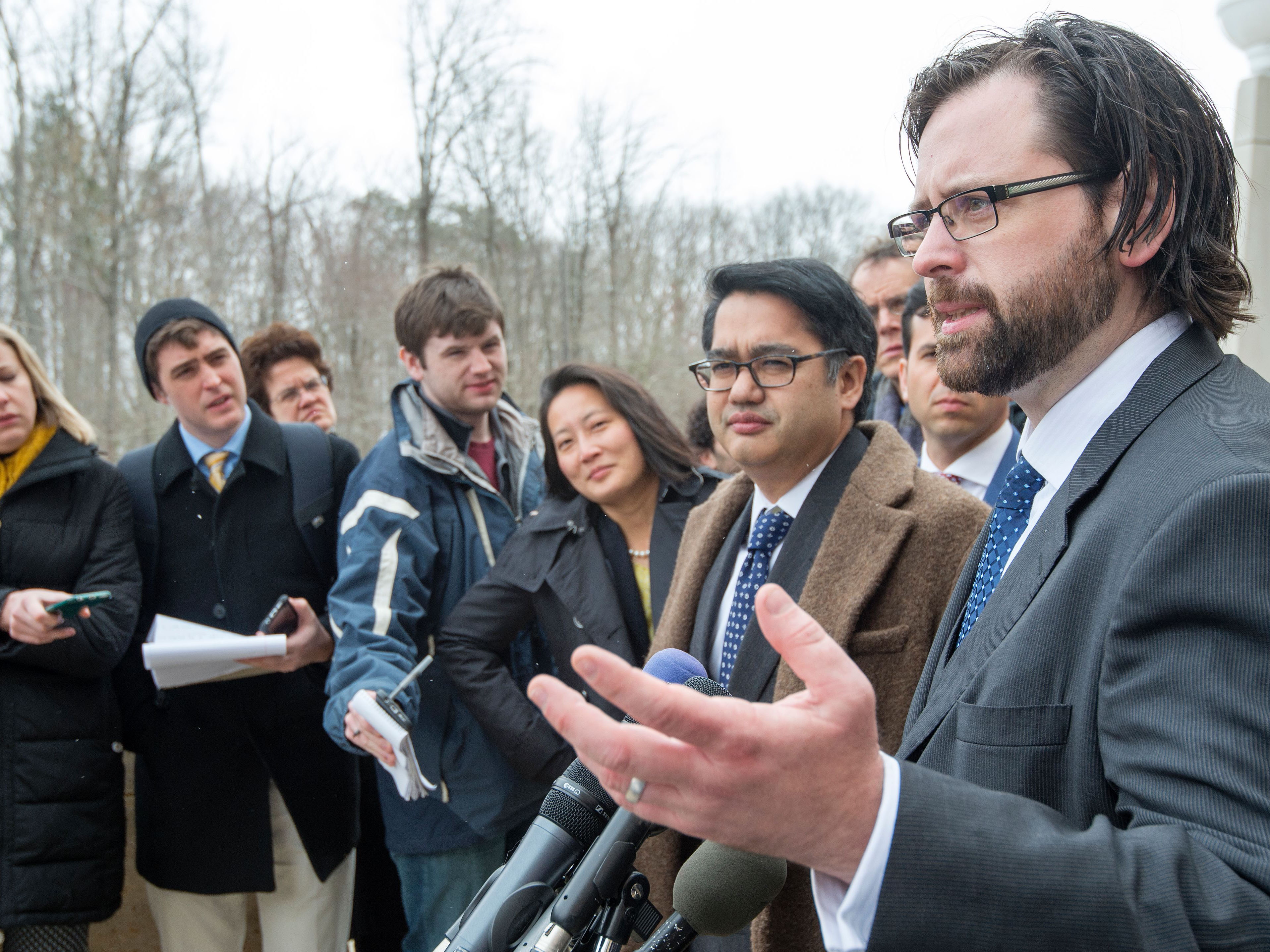First Rulings in MuslimBan2.0 Challenge: What Do They Mean?
By Rachel Nusbaum, HIAS.org
Mar 16, 2017

Attorneys representing HIAS and the other plaintiffs in a challenge to President Trump's Executive Order, Omar Jadwat, ACLU (L) and Justin Cox, NILC (R) deliver remarks to the media outside US District Court, Southern District of Maryland, March 15, 2017, in Greenbelt, Maryland.
(PAUL J. RICHARDS/AFP/Getty Images)
Today could have been the first day of a total ban on refugee arrivals to the United States under President Trump’s revised executive order. Instead, justice prevailed for refugees a second time, with decisions in two cases—our very own HIAS v. Trump case in Maryland and a case in Hawaii.
Last night, the first ruling came down on the revised executive order halting the refugee program and banning arrivals from six predominantly Muslim countries. The one the Trump administration has been insisting is definitely not a Muslim ban.
A federal judge in Hawaii found otherwise, issuing a temporary restraining order just hours before it was set to take effect, halting—at least for now—the implementation of the ban. In his ruling, U.S. District Judge Derrick K. Watson addressed the government’s argument that the court shouldn’t “look into the ‘veiled psyche’ or ‘secret motives’ of government decisionmakers.”
In response, Judge Watson ruled that, “the Government need not fear. The remarkable facts at issue here require no such impermissible inquiry. For instance, there is nothing ‘veiled’ about this press release: ‘Donald J. Trump is calling for a total and complete shutdown of Muslims entering the United States’.”
HIAS President and CEO Mark Hetfield expressed relief after reading the ruling. “While this is a temporary measure, we are pleased that the court has recognized the irreparable harm done to refugees who are prevented from finding safety in this country, as well as to their families here in the U.S. who seek to be reunited with them," he said.
The Hawaii ruling specifically blocks section six of the revised order, which would suspend the U.S refugee admissions program for 120 days. During that time, no refugees would be booked for travel to the United States, even if they had already been otherwise cleared and approved for resettlement as refugees. Nor would any decisions be made on new or pending applications.
Essentially, this could have been a full on freeze of the refugee program—a lifesaving humanitarian program that the U.S. has run for decades to offer protection and hope to some of the world’s most vulnerable people. Because of the importance of this issue HIAS also filed an amicus brief in the Hawaii case.
If the Hawaii ruling stands, tens of thousands of vulnerable refugees could have their chance at life-saving protection restored.
“As a Jewish organization that serves people of all faiths, we had grave concerns about the government’s attempt to impose a lightly edited Muslim ban. Such religious discrimination has no place in America, as the court has rightly recognized,” Hetfield added.
Earlier this morning, we got a second decision on the ban. This one came from U.S. District Judge Theodore Chuang, who heard an emergency motion from lawyers in HIAS v. Trump the day before the new ban was set to take effect.
Judge Chuang’s ruling also halts part of the executive order. While it does not go as far as the Hawaii ruling, the type of hold issued in this case (a preliminary injunction) is more durable than the temporary restraining order issued by Judge Watson in Hawaii. Judge Chuang’s ruling also leaves the door open for further discussion of our challenges to the refugee ban, an opening we intend to pursue. So stay tuned for more news as our lawsuit continues.
“Two federal judges have now ruled that the revised Executive Order is likely unconstitutional under the Establishment Clause,” said Hetfield.
“The judicial intervention over the past 24 hours prevented a grave impending harm to the world’s most vulnerable people, but this is only the first step,” Hetfield continued.
“President Trump’s intent to ban Muslims and refugees remains deeply troubling. That fact will not change, and neither will our resolve to return America to its tradition of welcome.”
To stay up to date on our legal challenges on behalf of refugees, follow HIAS on Facebook, Twitter and Instagram.



